Expedition 13 Hot Topics
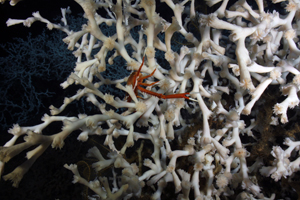
Many animals in the deep sea rely on others for food or shelter or both. These symbiotic relationships make the deep a complex and fascinating place to study. Learn more »
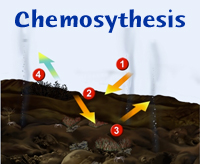
Where there is no light, life must find ways to survive that do not rely on photosynthesis. Some animals are able to convert chemicals that are usually considered poisonous. Learn more »
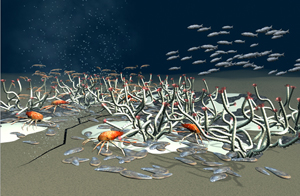
If there is any lesson to take from the Gulf of Mexico it’s that even someplace as close to shore and as relatively well studied as this can still offer some surprises. The Gulf is easy for scientists to get to, but still very complex. Learn more »
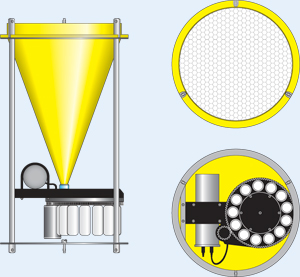
Sediment traps gather microscopic particles falling through the ocean—some of which become food for animals on the bottom. Learn more »
The manned submersible Alvin has been a star of deep-ocean research for the past 40 years. In 2011, Alvin will undergo a major overhaul that will include a larger personnel sphere and new, deeper-diving capabilities. Learn more »
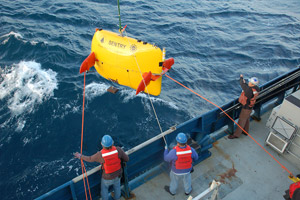 Autonomous Underwater Vehicle Sentry: Robotic Bloodhound of the Deep Ocean
Autonomous Underwater Vehicle Sentry: Robotic Bloodhound of the Deep Ocean
Sentry is a robotic deep submersible that can map the ocean bottom, take close-up photographs of features and animals on the seafloor, and make millions of measurements of the water in one trip and all by itself. Learn more »
Previous Expedition Hot Topics:
 Deep
Sea Biology Deep
Sea Biology
From Expedition 5: As we investigate the submarine slopes of Galápagos
volcanoes we see life that no one has photographed before. The creatures that
live at these depths have adapted to a way of life in one of the world's most
challenging environments. Learn
more »
 Deep-Sea
Corals Deep-Sea
Corals
From Expedition
7: When most people think of corals, they
think big. Big, interconnected structures such
as the Great Barrier Reef off Australia, which
can be seen from the Space Shuttle. Expedition
7 is going after much smaller coral formations
that lie deep within the ocean, past the point
where light penetrates. Learn
more »
 Keeping
the “Big O” Out of Alvin Keeping
the “Big O” Out of Alvin
From Expedition 1: Alvin pilot
BLee Williams explains the dangers of using electricity in
the ocean. Read
the article »
 What
Is It Like To Go Down In Alvin? What
Is It Like To Go Down In Alvin?
From Expedition 2: So you
want to dive to the bottom of the ocean in a submarine? Better
bring your wool hat, because it is cold down there. Begin
your dive »
 Seasickness Seasickness
From Expedition 6: It’s a fact of life on ships, but nobody talks
about it much. Why should they? It’s not a pretty picture. Yep,
I’m talking about the green scourge,
Neptune’s revenge—seasickness. Learn
about what causes seasickness »
[Back
to top]
|